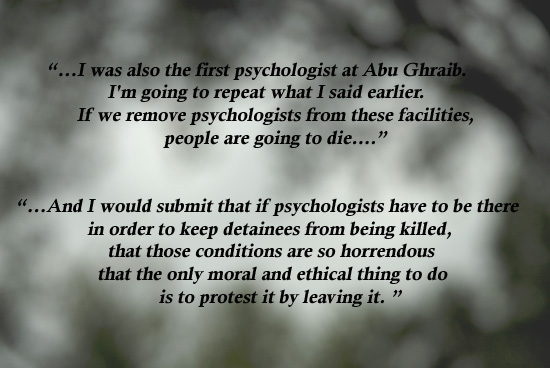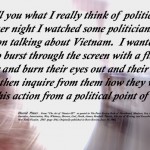Photo by Bob Parker ©2008
Quotes from APA Council debate comments by Col. Larry James and Dr. Laurie Wagner
To view a gallery of photographs click here.
Controversy persists within and without the 148,000 member American Psychological Association (APA) regarding psychologists’ ethics and roles in national security interrogations and their presence in detention centers such as Guantanamo, Abu Ghraib, and CIA Black Sites.
The next APA Convention will take place in Boston, August 14-17 2008, and the election for new president of the APA (the world’s largest professional association of psychologists) will take place in the fall. During the nominating process for presidential candidates this past spring, professional ethics and APA policy on psychologists’ roles in interrogations in detention centers played an important part in who votes were cast for. The recent presidential nomination outcome in which Dr. Steven Reisner garnered the most votes of 5 candidates, and other events over the past year attest to the central importance of how APA’s policy on interrogations affects professional identity and the perception of the profession and the APA on the international stage.
A sampling of those important events mentioned above include: Dr. Linda Woolf (a member of the working group charged by APA with producing the text of Substitute Motion 3) publishing an article online in the OpEdNews detailing her reasons for resigning from the working group after only 2 meetings. She described the process as a “pattern of groupthink” in which the goal of the working group was to deliver a “unified draft”. For example, she believed that goal took “precedence over other concerns and the time crunch precluded extensive, careful consideration of wording, issues of international law, and broader human rights concerns”, and that there was marginalization of any statements designed to restrict the roles of psychologists at detention centers.
Several distinguished psychologists resigned membership in the APA over its policy regarding psychologist involvement in interrogations. Award winning Psychologist and author Dr. Mary Pipher discusses in detail her reasons for resigning form the APA in a 2-part interview with journalist Amy Goodman ( Part 1), ( Part 2 ). The former Chair of the APA Ethics Committee Dr. Ken Pope also resigned his membership in APA and published his resignation letter to APA President Dr. Alan Kazdin on his website on 2/6/08.
A number of college and University Psychology Departments have passed resolutions calling on the APA take a stronger position against members participating in detention centers where detainees are denied due process and other legal protections. This list includes: Earlham College (which initiated this movement), and Guilford and Smith Colleges which quickly followed suit. Subsequent departments included California State University at Long Beach, the University of Rhode Island, and York College of the City University of New York. Mount Holyoke College is the most recent to join the list. On the international level, the Scandanavian Psychological Associations released a 5 page letter to the APA President raising concerns about a number of unresolved issues regarding APA policy on interrogations of detainees.
New developments keep emerging on a regular basis concerning our government’s policies regarding torture, and the role psychologists have played in the fomenting and implementation of these policies: such as release of Justice Department memo’s supporting the use of torture, President Bush’s acknowledgement that he approved of the use of torture; revelations that techniques of “enhanced interrogations” were based on Chinese torture and brainwashing techniques of the 1950’s; ongoing discoveries revealed during hearings of the Senate Select Committee on Intelligence; and publication of a book by President Bush’s former press secretary Scott McClellan discussing the issue of torture and the administration’s knowledge of the use of such measures; and recent publication of books by attorney Phillipe Sands (“The Torture Team: Rumsfeld’s Memo and the Betrayal of American Values”) and New Yorker journalist Jane Mayer (“The Dark Side: The Inside Story of How the War on Terror Turned Into a War on American Ideals”). These books expose through detailed investigation, the government’s role in actively promoting policies on the use of torture. A future post will keep viewers up to date with current developments and relevant links to articles and documents. For historical background viewers are encouraged to visit the page: “ Links Concerning APA, Psychology, and Torture” for an extensive list of links covering much background on the subject (compiled as of 12/30/07, and still quite relevant).
In anticipation of the upcoming APA convention in Boston, and the growing interest and awareness of APA policy and psychologists’ involvement in interrogations and torture by APA members, international psychology organizations, human rights groups, policy makers, and the lay public, I am posting an edited transcript and undedited transcript (PDF) of the deliberations and vote at APA Convention’s Council of Representatives’ meeting last August, regarding Substitute Motion 3 (Reaffirmation of the APA’s position against torture and cruel, inhuman, an degrading treatment) and an amendment to Substitute Motion 3 (restricting psychologists to the roles of healthcare provides in detention and interrogation centers).
It is my hope to contribute to an accurate historical record on these important issues that affects the role, identity, and reputation of psychologists and Psychology nationally and internationally. People just getting acquainted with these issues will hopefully benefit from the historical background this post and the next post covering the APA Town Hall meeting provide.
The Council transcripts are taken directly from digital audio recordings of the APA Council deliberations and vote in San Francisco on August 19, 2007. (The transcription was professionally conducted by Northwest Transcribers, Mill Creek, WA.) The edited version posted below was edited down from 46 double spaced pages covering the entire meeting. Not all who spoke at the Council meeting are included in the edited version. Editing emphasized the central issues brought before the Council by invited presenters and selected speakers during the comment period. The main intent of each speaker’s comments remains intact. For those wishing to access the entire unedited written transcript, here is a link to a PDF version.
Also included is the entire unedited proceedings of the Council debate and vote in audio mp3.
A Town Hall meeting took place several hours after the APA Council of Representatives meeting. Edited and complete transcripts, as well as unedited audio are available on the next post titled: American Psychological Association Town Hall on Interrogations, August 2007
To listen to an audio recording of the meeting, click on the yellow audio player below.
To play the media you will need to either update your browser to a recent version or update your Flash plugin.
Excerpts of APA Council Debate and Vote 8/19/07
AMERICAN PSYCHOLOGICAL ASSOCIATION
APA Council Debate and Vote On Substitute Motion 3 (and an amendment to Substitute Motion 3)
“Reaffirmation of the American Psychological Association Position Against Torture and Other Cruel, Inhuman or Degrading Treatment or Punishment and its Application to Individuals Defined in the United States Code as ‘Enemy Combatants’”
San Francisco, AUGUST 19, 2007
DR. HALDEMAN:… Madam President, Officers, and colleagues of Council. It’s my privilege and my responsibility to open the discussion on Item 5 on behalf of the Board of Directors… the motion that you have in front of you at your place and on the screen is the co-creation of Divisions 14, 17, 19, 32, 39, 41, 48, 55, the Divisions for Social Justice and Consultation from the Ethics Committee… I’m sorry, I forgot to add one thing, which is to say parenthetically you will notice what is not part of the substitute motion, and that is the segment on which the groups did not agree, which has to do with the limitation of participation of psychologists in detention centers where detainees are not granted their full civil and human rights. The language of that amendment, which will be introduced during the course of the discussion, is included in your packet in the front…
MADAM PRESIDENT: …I would now ask to — Neil Altman to come and make some comments on the issue that we are now focused on. And I will also then ask Morgan Sammons and Larry James as well.
DR. ALTMAN: I want to change the frame of what we’re going to talk about today. We’re not talking about a moratorium. We’re talking about the question of what human rights standards need to be in place for psychologists to be able to do their job in detention centers… I support the substitution motion. It has two major advantages from my point of view. One is that it lists specific interrogation techniques which are prohibited, taken from the UN convention against torture. And the second thing is it acknowledges that cruel, inhuman, degrading treatment and torture can be a property of the context as well as an individual’s behavior.
Now, I believe that minimum standards for human rights are not in place in the detention centers, such as Guantanamo Bay and the CIA so-called black sites because the detainees are accorded neither the Geneva Accord protections afforded to prisoners of war nor are they charged with a crime in a timely manner as required in criminal cases. And this constitutes cruel, inhuman and degrading treatment to hold people without charging them, without clearly defining their status, and in an indefinite manner, over five years for over 300 people at Guantanamo Bay, for example.
These conditions make the gathering of reliable information very, very unlikely as was pointed out by Steve Kleinman, a person who has 24 years of operational experience in the intelligence community and who spoke the other day in the panel as part of the mini-convention. Mr. Kleinman authorized me to read the following statement. He says, “I’ve strongly believed that it would be in the best interests of everyone involved in the interrogation process, including the interrogators, supervisors, commanders, and the host of subject matter experts supporting interrogations, including behavioral science consultants, if an unequivocal standard of ethics and conduct were to be established based on a recognized and widely accepted controlling authority. Toward that end, I can think of no better sources than the Constitution of the United States and the Geneva Convention relative to the treatment of prisoners of wars.” And he says, “These standards could protect interrogators.”
I also have a supportive statement from Michael Gelles who served 16 years as chief psychologist for the Naval Criminal Investigative Service. And Dr. Gelles says, “The fact that we’ve moved away from a moratorium and toward a position that defines what we’re going to do and what we’re not going to do is an important protection for psychologists today and in the future who are trying to support national security. It is important, too, that for psychologists to be participating in interrogation operations…the environment…should be one in which human rights are [inaudible].
MADAM PRESIDENT: Thank you. Dr. Sammons and Dr. James?
DR. SAMMONS: …I’m Morgan Sammons. I represent Division 55, but I am speaking now as a military officer and a psychologist in the Navy… I strongly urge support for the reaffirmation of the Association’s position against torture and other cruel, inhuman and degrading treatment… The question is not whether psychologists should be involved in such activities. On this I am sure unanimous opposition exists. The true questions are two-fold. One, how we preserve ethical practice in any circumstance where the ability to give free and fully informed consent is in whatever fashion constrained; and two, how psychologists can assist in the collection of national security data in a manner that is ethically sound, morally defensible, and operationally useful. In every instance that I am personally aware of for psychologists’ participation has — every instance I’m personally aware of, psychologists’ participation has resulted in improved oversight, leading to greater protection of detainees.
Dictating a moratorium against psychologists’ involvement in national security data collection will have the opposite effect and may place at greater risk those whose rights we are concerned about protecting.
COL. JAMES: I’m Col. Larry James. I’m going to keep my comments short. First thing I want to say, and it’s very important, thank God this is a democracy — thank God this is a democracy. I actually welcome and support all of the discussion and the debate. That’s why [inaudible] this issue because I’m very, very proud of this democracy. So, I want to thank Dr. Altman and his colleagues for having the courage to speak out, although I may disagree with many of the things they say. God bless America.
Number two, torture is wrong. How can anyone disagree with that? So, under no conditions would myself or any of the psychologists you see here today and in the uniforms that they wear representing our country would ever support anything that allows torture or inhumane treatment.
Thirdly and lastly, if we remove psychologists from the front in any capacity whatsoever, innocent people are going to die. Innocent people are going to get hurt. Phil Zimbardo told us this was going to happen 30 years ago. And so going back through the chronicles of history, in any detention facilities that we’ve set up anywhere in the world, when you don’t have psychologists involved in policy decision-makings, when you don’t have psychologists involved in the day-to-day activities, bad things are going to happen. Innocent people are going to die.
MADAM PRESIDENT: Thank you. We’ll now open the floor to debate.
DR. TAYLOR: My name is Hank Taylor. I’m representing Division 21, Applied Experimental and Engineering Psychology. And I have 50 years’ experience as a military psychologist, 23 in uniform as an Air Force officer, and 27 as a university professor at a major research university… I believe that the record as the resolution shows is very clear that military psychologists made a very, very positive condition. It would be wrong to remove them from a situation where they couldn’t make their contribution. I strongly urge you to support the Substitute Motion 3.
DR. VAN HOORN: Judy Van Hoorn, Division 48, Society for the Study of Peace, Conflict and Violence… the substitute motion, contains a lot of the language from last year that has led to great confusion… we want to affirm — reaffirm that you’ll find in the document that are really critical are the statement that last year’s resolution remains the comprehensive broad document that applies in all cases and that this is a specific application.
Two, you’ll find that this document is critical because it reaffirms our definition of torture and our definition of cruel, inhuman, degrading treatment and punishment, including the Fifth, Eighth and 14th Amendment, and that those definitions, those Amendments apply to all persons, the guarantees.
And thirdly, we reaffirm actually for the third time or fourth time that there is no condition, whether threat of war, any condition that would permit torture or other cruel, inhuman, degrading treatment and punishment.
DR. STRICKLAND: Good morning. I’m Bill Strickland. I represent Division 19, the Society for Military Psychology. I was part of a group, including Judy and several speakers behind me, who have been working over the last few days to get this resolution right. You probably haven’t had time to study it. I’m asking you to trust us. But, I do want to point out Resolutions starting at Line 76 and running through 108 are — extend what we did last year, an unequivocal condemnation against knowing participation in planning, designing, assisting in the use of torture in any form of cruel, inhumane or degrading treatment. And then the big resolution at Line 81, which lists absolute prohibitions and then some other things where psychologists may be present but not part of the operations of the facility. And we wanted to make it clear that indirect participation in — doesn’t include the psychologists at the facility when the guards are doing something bad.
So, there’s two sets of resolutions in that section starting at Line 81, an absolute prohibition against some really bad stuff, and an prohibition against using some things in an interrogation session that we acknowledge may happen in a prison setting. And then the resolution at 102 calling upon APA to make it clear to the government that we really want all of this stuff to stop all the time…
DR. WAGNER: I’m Laurie Wagner, Council representative from the Division of Psychoanalysis and Division 39’s liaison to the Divisions of Social Justice.
I first want to say that I feel honored to have been a member of this working group that put this resolution together, and I want to speak today at the moment specifically to Lines 110 through 152, which council members have before them.
I think one of the most key elements that I want to point out is that cruel, inhuman, degrading treatment and punishment derives not only from the behaviors of individuals, but the conditions of confinement… When we looked at the 2006 resolution last year, we defined conditions of confinement and that individuals who lacked the protection of the Fifth, Eighth and 14th Amendments of the US Constitution, that those individuals that lacked that protection, the lack of that protection does, in fact, constitute cruel, inhuman, degrading treatment and punishment.
And so this resolution takes that issue a step further in that if you read it carefully, it talks about the grave concerns that we have about the lack of those conditions. And I hope that as we continue this discussion, that we can carry it further as to then the real question is, is what do psychologists do in settings where the individuals there do not have those protections?..
DR. WIGGINS: I’m Beth Wiggins, representing Division 41, Psychology and Law. I too worked with the group over the past four days to develop this substitute motion… I’m here to speak to Lines 154 to 167. These lines call for the Ethics Committee to proceed forthwith in writing a casebook and commentary to set forth guidelines for psychologists… We feel that complex issues such as the ones we’re discussing on the floor today of ethics need very careful study and deliberation by a diverse group of people…
DR. DEUTSCH: I’m Robin Deutsch. And I want to say that as chair of the Ethics Committee, I am very, very impressed with the collaborative process that went into developing this Substitute Motion No. 3… [T]he casebook commentary…has been a challenge for the Ethics Committee because Council has been appropriately so active in writing resolutions on this issue. And given the complexity and the importance of this issue, the Ethics Committee wanted to have the full benefit of the extensive programming on ethics and interrogation at this convention in its work on the casebook and the commentary.
In this resolution Council gives the Ethics Committee very clear direction that the time to write the casebook and the commentary is now… [T]his process of writing the casebook and the commentary will be open, transparent, and participatory… The Committee will seek your input and your involvement. And you will be informed at each step of the way as the work moves forward.
DR. OKORODUDU: I’m Corann Okorodudo, representing Division 48 and a member of the consensus group that developed the Substitute Motion No. 3. The American Psychological Association is the world’s largest association of psychologists. We need to be able to take as strong as possible stance on human rights for our association, for our society, and indeed for psychologists in the world. The amendment to the substitute motion that I’m going to ask to be placed on the floor for discussion was one that we in the consensus group could not come to consensus on. But, it is a very important amendment. The substitute motion reaffirms our 2006 resolution against torture. It goes further and produces some forward-moving elements such as the listing of specific techniques that should not be used by psychologists. It even goes further to express the American Psychologists’ strong, grave concern about conditions in detention where detainees are denied their human rights. This is a very strong statement. It even goes further to say — recognize the right of psychologists to refuse to participate, in fact, to disobey rules and regulations under these conditions.
But, is this enough? And so I’m putting — asking to place the Amendment on the floor for discussion. You see the Amendment on the overhead. It asks that psychologists in such settings where detainees are deprived of adequate protection of their human rights, should be limited to the provision of a military psychological treatment as health personnel.
DR. STRICKLAND: I’m Bill Strickland. I represent Division 19, the Division for Military Psychology.
Let me state that again it’s the Division for Military Psychology. It’s not the division in favor of war. It’s not the division that supports torture. And it’s certainly not a division against social justice. We’re a division of people who perform services for the United States Government, primarily.
This particular amendment, as we’ve called it a non-participation amendment, is very much like the moratorium amendment that was the original motion… I would point out that in governance last spring seven governance groups and the Board of Directors all disagreed with the notion that psychologists should be prohibited from performing their jobs based on a location in which they will be performing them, and that’s what this amendment proposes.
Psychologists routinely work in situations where clients and patients are involuntary participants. Does anybody believe that that fact makes our participation in those settings unethical? I suspect not. The question is, what do we do when we’re working in those settings?
Non-participation in this amendment appears to have two rationales. One is the situation is really bad, and we need to protect detainees to make their situation better. Does removing psychologists from the situation do that in any way? I think not. The situation would only get worse as you’ve heard both Capt. Sammons and Col. James state a little earlier.
Secondly, we’ve heard that the purpose of non-participation is to protect military psychologists, people who would find themselves in this situation.
The Substitute Motion 3, which is now the main motion… Every word of the motion that is now our main motion, we support. We’re not lookin`g for help. And as Corann pointed out, by the way, there is a provision in there that says psychologists shouldn’t have to work in places they don’t want to work in. What this motion says is psychologists can’t work in places where somebody else doesn’t want them to work. Would we accept that if the purpose of this motion were to say psychologists who are five-ten, blond and over 50 can’t do something because they’re too insensitive to recognize when an unethical procedure is being performed? We would dismiss that immediately. If we picked any minority group within the Association and said that group is too insensitive to know when unethical activities are taking place so we can’t even let them go there, we would reject that out of hand. That’s what this motion, what this amendment is saying for a minority group in this association that is bound by ethical procedures, that agrees with every word of the main motion now, we’re saying that’s not enough because you don’t understand the words and you’ll get in trouble. And I just have to say I strongly disagree with that, and I urge you to vote against this amendment…
DR. LOTT: I’m Bernice Lott, representing Division 9, the Society for the Psychology Study of Social Issues… In contrasts to the interpretation that you’ve just heard from someone who urged you not to support it, I think you will find that the words in the very last sentence are… “psychologists should be limited in their work in detention centers to work as health personnel.”… To me, the logical and ethical conclusion, to Substitute Motion 3 is, in fact, this amendment. Without this amendment, what we have are some wonderful words not accompanied by deeds. Taking Substitute No. 3 and adding this “be it resolved” makes this a strong expression of APA’s bad news. It makes it a strong statement. It brings everything to a conclusion because in Substitute Motion 3, and other people have already pointed out, there is a list of really terrible procedures. Why are they there? They are in that motion because they have been implicated in interrogations.
Substitute Motion 3 talks about the inhumane conditions under which the detainees are detained… It says they by themselves are degrading, torture-like… We talk about the Fifth, the Eighth, the 14th Amendment… if we believe what Substitute Motion 3 has to say in its text and it looks like that’s going to be the sentiment, the logical and ethical conclusion is to accept the proposed amendment.
DR. VAN HOORN: Judith Van Hoorn, Division 48… I want to read you from a statement of the American Bar Association president, Karen Mathis, concerning the Defense Counsel access to Guantanamo detainees. She wrote in part, “The ability of lawyers to confer with their clients and advocate for justice for these clients is a deeply imbedded principle of American democracy. The principles of freedom, due process and justice are too critical to our national character to be abandoned in any manner.”… For me and Division 48 there needs to be a line that we say we will not be bystanders. There’s a considerable psychological work in the area of the importance of bystanders in making sure that torture and other cruel, inhuman, degrading treatment and punishment does not occur. We are all bystanders to what’s happening in Guantanamo and other US detention centers, and I ask that we take an active role so that we don’t remain passive bystanders.
DR. WIGGINS: I am Beth Wiggins from Division 41… many of the members of Division 41 work in the area of correction, interrogations, and other aspects of law enforcement. They provide treatment. They perform assessments. And they also do research in these areas… they feel very strongly that just because a psychologist works in a very challenging situation does not make their work unethical. And more so, indeed by walking away from such settings, they become the bystander that my colleague just mentioned, and it’s the client that gets hurt, not the system. Walking away doesn’t close the system. It doesn’t help it make it better.
The second major point… is that this resolution would prohibit some of Division 41 members who are not health providers from making very positive contributions in very challenging situations… it would prohibit two of my colleagues who this year received Presidential citations from their work from providing assistance in a very positive way in this environment. Many of our members do research, as you may know, of interrogation procedures and false confessions. They try to identify those kinds of interrogation procedures that lead to the elicitation of false information. And they’re often called by prosecutors who have a piece of paper in their hand, I have a confession from someone; do you think this is reliable? This amendment would say they couldn’t answer that call… The other of my Division 41 who received a Presidential citation for his work in eyewitness testimony, looking at different lineup procedures that lead to faulty identification also couldn’t participate because of this…
DR. ALTMAN: I’m Neil Altman… we’re not talking about situations where the detainees do not have the opportunity to consent. And we’re not talking about challenging situations. We’re talking about situations where the people being interrogated do not have human rights, and that’s what makes the entire context cruel, inhuman and degrading, and that our previous commitments as an organization, both made here in the Council and also in terms of the commitments we made when we became a non-governmental member of the United States require us not to support cruel, inhuman and degrading treatment. So, that’s number one… Number two is that this resolution as it’s intended and as I read it does not supplant the decision-making power of the individual who might choose to continue working there. This is not a prohibition. This is a statement of principle from the American Psychological Association. And I think we need to make a distinction between the organization taking a position about what it thinks is the right thing to do and the individual’s autonomy…
DR. WAGNER: Laurie Wagner, Division of Psychoanalysis, 39.
…I think that if we as an organization have affirmed that the conditions of confinement are cruel, inhuman and degrading treatment of punishment when there is a lack of fundamental principles of justice, we then have to logically ask the next question: What do we do in those situations? I know that Capt. Sammons in my discussions with him has said, we provide an ethical presence. I think that it’s true that psychologists in some of those settings can do good work. But, if the setting itself by our own definition constitutes cruel, inhuman and degrading treatment and punishment, then it’s an unethical situation, and I would submit that we as psychologists, how are we ethically in an unethical situation? I don’t think we can. I think we could act morally, but I don’t think we can ethically. And that is why we should not be involved in any way except in providing treatment…
Col. JAMES: Folks, I came here from Cuba, so I have lots of first person experience about all of what we’re discussing. This is my second tour at GITMO Cuba. I was also the first psychologist at Abu Ghraib.
I’m going to repeat what I said earlier. If we remove psychologists from these facilities, people are going to die. If we removed psychologists from these facilities, people are going to get hurt… One other thing I want to add: We’ve got young 27, 28, 29-year-old psychologists on the battlefield right now. If you support this amendment, those young psychologists are going to feel as though we’ve abandoned them, and they need our support right now…
DR. OMOTO: My name is Alan Omoto, and I’m proud to represent Division 9, the Society for the Psychological Study of Social Issues… I actually have a personal investment in this issue as a child of having a family that was all interned during World War II because they had the misfortune of being of Japanese ancestry and living on the West Coast. And I think that we as a discipline are better than this and that we need to draw the hard, firm line to say that we don’t tolerate these kinds of actions, we don’t tolerate these settings. So, for the science, the principles and appreciation of that history I hope that we will adopt this… motion as well as the Amendment.
DR. LOTT:… …this is specific to the detention centers that exist right now… It is not — doesn’t deal with prisons. It deals only with the detention centers that exist at this moment with all of the lack of human rights and legal rights and indeterminate sentences and no charges and no due process…
DR. WAGNER: Laurie Wagner, Division of Psychoanalysis. I just wanted to make one small comment that is in response to something that I took very seriously when I heard Col. James say that if psychologists are not present in Guantanamo and other settings similar to it, that innocent lives will be lost. And I asked him what he meant by that, and he said the lives of detainees. And I would submit that if psychologists have to be there in order to keep detainees from being killed, that those conditions are so horrendous that the only moral and ethical thing to do is to protest it by leaving it.
DR. ALSENGOOD [sic]: I am Hertz Alsengood [sic], Division 25, Behavior Analysis. We all have to work against torture in the name of the United States… But, I think we have an amendment here which really doesn’t go in the right way. It’s like, you know, I’m going to cover my eyes; I don’t want to see it. I don’t want to see the torture is what this says. That can’t be a role for a psychologist, for an ethical person. An ethical person has to be there, bear witness and try to interfere with the torture. Going away is not a good solution…
DR. SAMMONS: As my colleagues from Division 9 and Division 39 suggest, it is time to take a strong stand against abusive practices in Guantanamo Bay and elsewhere. In the main motion we have done so. This amendment as written does not. As worded it is not specific to detention centers and will deny detainees in whatever setting the protections that we seek to provide them.
Dr. Strickland: Bill Strickland, Division 19. We had this discussion a little earlier, several of us, on the drafting committee. And, frankly, those words were acceptable to me until it was pointed out by some other members of the drafting committee that those words actually made things less clear. One could conceive of a situation where the normal operation of the detention center at Guantanamo is the guards are out of control. And we don’t want that to be the standard by which prisoners at Guantanamo could be interrogated. That’s why we changed the wording from severe to significant (regarding sleep and sensory deprivation, and sensory stimulation), actually causing harm as opposed to something outside the normal operation of the prison because the definition of “normal” is not something that any of us were comfortable leaving in that amendment — or in the motion.
MADAM PRESIDENT: All right. So, let’s take Dr. Corann’s suggested amendment and we’ll vote on it. All those in favor please signify by saying — raising your hand. Accept his motion. All those opposed? Okay. It’s defeated.
Now we move to the main motion. All of those in favor of the main motion, which is the Substitute Motion 3, please raise your hand. All those opposed? Motion carries.
This is end of Council. This has been an extraordinary session, and I thank all of you for your dedication. By the way, this afternoon at five to 6:30 p.m. there will be a town hall meeting on Ethics and Interrogation. I urge you to attend.
[Session ends.]














Thank you for this striking presentation of a momentous event in the history of American psychology. You provide an aid to moral deliberation and moral accountability for the APA.